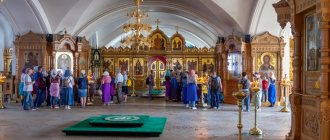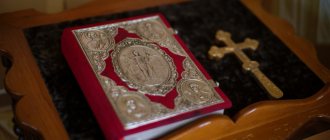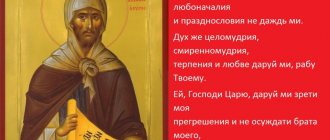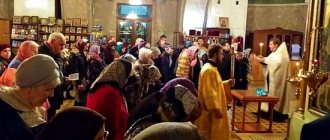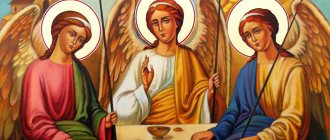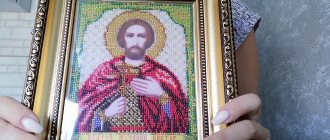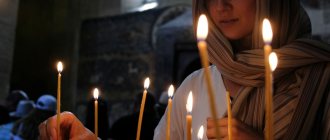The liturgical regulations for reading the Psalter are stipulated in Chapter 17 of the Typikon. In general, Orthodox worship basically consists of the Psalter. The psalms are the core, the foundation of the service. There is not a single service in the daily liturgical cycle that does not use psalms; in almost all sequences of the Trebnik, texts from the Psalter are used.
Along with the reading of kathismas at Vespers, Matins and the Lenten Hours, psalms are used separately in divine services (for example, the Hours are based on three psalms) and verses from them (prokeemny, chants to stichera).
During the week in churches, the Psalter must be read in full once, during the period of Great Lent, twice a week.
For the laity, the Psalter has become an indispensable book in home prayer. There are no special instructions here on how to read the Psalter at home, but the general rules are similar to the liturgical ones. The Psalter is read with prayers for health and the repose of the departed, especially during periods of fasting.
Rules for reading the Psalter at an Orthodox service
The period when two kathismas are read at Matins
Period:
- From the Week of Antipascha to the celebration of the Exaltation
- From December 20 to January 14 according to the church calendar
- During Meat and Cheese Weeks
Note
On weekdays, if a polyeleos matins or vigil is served, then at Vespers on the eve of the holiday the ordinary kathisma is omitted, and instead the 1st antiphon of the 1st kathisma (“Blessed is the man”) is sung.
| Saturday | Sunday | Monday | Tuesday | Wednesday | Thursday | Friday | |
| Matins | 16,17 | 2,3 | 4,5 | 7,8 | 10,11 | 13,14 | 19,20 |
| Vespers | 1 | — | 6 | 9 | 12 | 15 | 18 |
Canons and akathists
The canon is a church hymn for glorifying the Savior, the Mother of God, the Most Holy Trinity; glorification can also refer to some saint or church holiday. The first canons were created back in the 7th century. The canons form the most important part of the church service, but Orthodox Christians can also read them privately, that is, at home. Certain canons must be read when preparing for communion.
An akathist is a chant of praise that is part of the liturgy, but can be read separately at home.
It sings in poetic form the most important moments from the life of the Savior, Our Lady or the saint to whom it is dedicated. From Greek, akathist is translated as “singing without sitting down,” however, an exception is often made for the sick and those who are very old and praying. Reading while standing does not allow you to relax and reduce the intensity of prayer, so at home you need to do it while standing.
An akathist addressed to saints with a prayer request is often read by believers, but first you must receive a church blessing for this, even if you read it at home and not in church. It is best to read it according to the Orthodox prayer book. As a rule, the akathist or canon is read at the end of the morning or evening prayer, at the very end before the prayer “It is worthy to eat,” but a separate reading of the akathist is also possible.
It should be remembered that first it is necessary to say special prayers before reading the akathist, and if we are talking about the canon, then the corresponding prayers before reading the canon.
The period when three kathismas are read at Matins
Period:
- From the giving of the Exaltation to December 20 (old style)
- From January 15 (Old Style) to Saturday before the Sunday of the Prodigal Son
Note: On weekdays, if a polyeleos matins or vigil is served, then at Vespers on the eve of the holiday the ordinary kathisma is omitted, and instead the 1st antiphon of the 1st kathisma (“Blessed is the man”) is sung. At Matins, 2 kathismas are read, and the third row is read at Vespers, instead of the 18th.
| Saturday | Sunday | Monday | Tuesday | Wednesday | Thursday | Friday | |
| Matins | 16,17 | 2,3 | 4,5,6 | 7,8,9 | 10,11,12 | 13,14,15 | 19,20 |
| Vespers | 1 | — | 18 | 18 | 18 | 18 | 18 |
During the period of Great Lent
Note: If the polyeleos are sung at Sunday Matins, then the reading of the 17th kathisma is canceled, only the 2nd and 3rd are read.
| Saturday | Sunday | Monday | Tuesday | Wednesday | Thursday | Friday | ||
| 1,2,3,4 and 6 weeks of Great Lent | Matins | 16,17 | 2,3,17 | 4,5,6 | 10,11,12 | 19,20,1 | 6,7,8 | 13,14,15 |
| 1st hour | — | — | — | 13 | 2 | 9 | — | |
| 3rd hour | — | — | 7 | 14 | 3 | 10 | 19 | |
| 6th hour | — | — | 8 | 15 | 4 | 11 | 20 | |
| 9th hour | — | — | 9 | 16 | 5 | 12 | — | |
| Vespers | 1 | — | 18 | 18 | 18 | 18 | 18 | |
| 5th week of Vel. Posta | Matins | 16,17 | 2,3,17 | 4,5,6 | 11,12,13 | 20,1,2 | 8 | 13,14,15 |
| 1st hour | — | — | — | 14 | 3 | — | — | |
| 3rd hour | — | — | 7 | 15 | 4 | 9 | 19 | |
| 6th hour | — | — | 8 | 16 | 5 | 10 | 20 | |
| 9th hour | — | — | 9 | 18 | 6 | 11 | — | |
| Vespers | 1 | — | 10 | 19 | 7 | 12 | 18 | |
| 5th week of Vel. Lent, if Thursday is the Annunciation, then the Great Canon is read on Tuesday | Matins | 16,17 | 2,3,17 | 4,5,6 | 12 | 19,20,1 | 6,7,8 | 13,14,15 |
| 1st hour | — | — | 7 | — | 2 | 9 | — | |
| 3rd hour | — | — | 8 | 13 | 3 | 10 | 19 | |
| 6th hour | — | — | 9 | 14 | 4 | 11 | 20 | |
| 9th hour | — | — | 10 | 15 | 5 | 12 | — | |
| Vespers | 1 | — | 11 | 16 | — | — | 18 | |
| Holy Week | Matins | 17 | 2,3 | 4,5,6 | 9,10,11 | 14,15,16 | — | — |
| 1st hour | — | — | — | — | — | — | — | |
| 3rd hour | — | — | 7 | 12 | 19 | — | — | |
| 6th hour | — | — | 8 | 13 | 20 | — | — | |
| 9th hour | — | — | — | — | — | — | — | |
| Vespers | 1 | — | 18 | 18 | 18 | — | — |
What is the Psalter and why read it?
The Psalter is not just a collection of prayers, it is a book containing ancient Divine hymns, recorded by different authors long before the appearance of Jesus Christ on earth. Most of the texts were created by King David during his reign. Among the authors of the psalms are Moses, Abraham, Adam and others. The role of the Psalter is defined as communication with God through prayer and at the same time spiritual edification. Every time a person reads ancient sacred texts, he receives a Divine revelation.
Recommendations for cell (home) reading of the Psalter
The Psalter is not read during the period from Maundy Thursday of Holy Week to Thomas Week (anti-Easter). During these ten days, all reading of the Psalter is canceled, both in churches and privately. In all other cases, the Psalter is read by the laity.
In cell readings, it is customary to divide kathismas into three Glories. Before and after kathisma, special prayers are read.
Before starting to read a kathisma or several kathismas:
Through the prayers of our holy fathers, Lord Jesus Christ our God, have mercy on us.
Amen. Heavenly King. Trisagion. And according to Our Father...
Lord have mercy (12 times)
Come, let us worship the King our God. (bow)
Come, let us worship and fall down before Christ, our King God. (bow)
Come, let us bow and fall down to Christ Himself, the King and our God. (bow)
On Slava:
Glory to the Father and the Son and the Holy Spirit, now and ever and unto ages of ages. Amen
Alleluia, alleluia, alleluia. Glory to You, God. (three times)
Lord have mercy (three times)
Glory to the Father and the Son and the Holy Spirit, (here you can read prayers with remembrance for health and repose or special petitions)
now and ever and unto ages of ages. Amen
After reading the kathisma, Trisagion, troparia and prayer for kathisma
And in the end:
It is worthy to eat as truly to bless Thee, the Mother of God, the Ever-Blessed and Most Immaculate and the Mother of our God. We magnify You, the most honorable Cherub and the most glorious without comparison Seraphim, who gave birth to God the Word without corruption.
Glory, even now. Lord, have mercy (three times).
Lord Jesus Christ, Son of God, prayers for the sake of Your Most Pure Mother, by the power of the Honest and Life-Giving Cross and the holy heavenly powers of the disembodied, and the holy and God-bearing fathers ours, and the Holy Prophet David, and all the saints, have mercy and save me, a sinner, for I am good and Lover of humanity. Amen.
Prayers for health and peace on Slavy
Save, Lord, and have mercy on my spiritual father (name), my parents (names), relatives (names), bosses, mentors, benefactors (names) and all Orthodox Christians.
Rest, O Lord, the souls of Your departed servants: my parents, relatives, benefactors (names) and all Orthodox Christians, and forgive them all sins, voluntary and involuntary, and grant them the Kingdom of Heaven.
Reading psalms during the week (during the week)
On Sunday - Ps. 23
On Monday - Ps. 47
On Wednesday - Ps. 93
On Friday - Ps. 92
On Saturday - Ps. 91
Reading the Psalter for every need
The Monk Arsenios of Cappadocia used psalms for blessing, suitable for various occasions; especially in cases where there was no church order for a special need. The Greek primary source can be found in the publication “0 Heron Paisios” by Hieromonk Christodoulos, Holy Mount Athos, 1994.
(The number indicates the number of the psalm, and then indicates for what need it should be read)
- 1. When you plant a tree or vine, let it bear fruit.
- 2. May the Lord enlighten those coming to meetings and councils.
- 3. Let anger leave people, and let them not unjustly torture their neighbors.
- 4. May the Lord heal those who are soft-hearted and who become despondent at the sight of the deeds of the hard-hearted.
- 5. May the Lord heal the eyes wounded by the villain.
- 6. May the Lord free those under spell.
- 7. Tormented by fear from the intrigues and threats of villains.
- 8. Wounded by demons or wicked people.
- 9. May demonic insurance in dreams or temptations during the day cease.
- 10. Abusive spouses who bicker and get divorced (when an abusive husband or wife torments the spouse).
- 11. Mentally ill people who are tormented by anger and attack their neighbors.
- 12. Suffering from liver diseases.
- 13. Read from the demon three times a day for three days.
- 14. Let thieves or robbers turn and return home and repent.
- 15. May the lost key be found.
- 16. In case of serious unfair accusations, read three times a day for three days.
- 17. During earthquakes, other disasters or thunderstorms.
- 18. Let the woman in labor give birth.
- 19. To barren spouses, so that the Lord heals them and they do not divorce.
- 20. May the Lord soften the hearts of the rich and give alms to the poor.
- 21. May the Lord control the fire and may there be no great damage.
- 22. May the Lord pacify disobedient children so that they do not upset their parents.
- 23. May the door open when the key is lost.
- 24. Those who suffer greatly from temptations, that they lose and complain.
- 25. When someone asks God for something, so that He may give it without harm to the one asking.
- 26. May the Lord protect the peasants from the enemy army, so that there is no harm to the people and fields.
- 27. May the Lord heal those suffering from mental and nervous illnesses.
- 28. Those suffering from seasickness and fearing a stormy sea.
- 29. In dangers in distant lands, among those who exist, among the barbarians and the godless, may the Lord protect them and enlighten the people of those lands and pacify them, so that they know God.
- 30. May the Lord provide sufficient grain and fruits when the weather is unfavorable for farming.
- 31. May lost and confused travelers find their way.
- 32. May the Lord reveal the truth about those unjustly convicted and may they be released.
- 33. Those standing on the verge of death when they are tormented by demons. Or when the enemy invades with sinister intentions.
- 34. May the Lord free the good from the snares of the evil ones that oppress the people of God.
- 35. May hostility dissipate after disputes and misunderstandings.
- 36. Wounded by robbers.
- 37. For toothache.
- 38. May the abandoned and discouraged find work so that they will no longer grieve.
- 39. May the owner and the employee make peace after a quarrel.
- 40. May the wife be delivered successfully if the birth is premature.
- 41. Young people, when they suffer from unhappy love.
- 42. May our compatriots be freed from enemy captivity.
- 43. May the Lord reveal the truth to the spouses if there was a misunderstanding between them, so that they can live in peace and love.
- 44. Suffering from heart or kidney disease.
- 45. Young people who are not allowed to marry by their enemies out of envy.
- 46. In order to reconcile the worker or the owner when the worker leaves offended by the owner, and to find him a job.
- 47. When gangs of robbers rob people and grave disasters occur, read for 40 days.
- 48. To those whose work is fraught with danger.
- 49. Let those who have wandered away from God repent and turn, that they may be saved.
- 50. When, because of our sins, God sends punishment (a pestilence of people or animals) for admonition.
- 51. May the hard-hearted rulers repent and may their hearts soften, and may they stop torturing the people.
- 52. May God bless the nets and may they be filled with fish.
- 53. May the Lord enlighten the rich who bought slaves, and may they set them free.
- 54. May the good name of the family that was unjustly accused be restored.
- 55. For soft-hearted people who are hurt by their neighbors.
- 56. Those suffering from headaches resulting from great tribulation.
- 57. May circumstances favor those who work with good intentions, and may the Lord rebuke demons and wicked people.
- 58. To the dumb, may the Lord give them the gift of speech.
- 59. May the Lord reveal the truth when many people are unjustly condemned.
- 60. Those who find it difficult to work out of laziness or fear.
- 61. May the Lord deliver the weak from adversity, so that he does not complain.
- 62. May the fields and trees bear fruit during the drought.
- 63. When someone is bitten by a mad dog or a wolf.
- 64. May merchants prosper.
- 65. May the evil one not bring discord into the house, and may not plunge the family into sorrow.
- 66. Blessing be on livestock.
- 67. May those suffering from miscarriages be healed.
- 68. When the rivers flood from the rains and wash away people and houses.
- 69. To the soft-hearted, who are sad and fall into despair over trifles, may the Lord strengthen them.
- 70. For those who are lonely, who, due to the machinations of demons, are bored with their neighbors and fall into despair, may the Lord have mercy on them and heal them.
- 71. May God bless the new harvest that the peasants are reaping.
- 72. Let the robbers repent.
- 73. May the Lord protect the peasants who work in the fields when the enemy surrounded the village.
- 74. May the evil owner reconcile and not torment his neighbors and workers.
- 75. To a mother who is afraid during childbirth, may the Lord strengthen and protect her.
- 76. When there is no mutual understanding between parents and children, may the Lord enlighten them, so that children obey their parents, and parents love their children.
- 77. May the Lord enlighten creditors so that they will be compassionate and not extort debts from debtors.
- 78. May the Lord protect villages from plunder by enemy troops.
- 79. May the Lord heal the patient with dropsy.
- 80. May the Lord not leave the poor in need and grief, who have fallen into despair from poverty.
- 81. So that people buy goods from peasants, and they do not fall into grief and despair.
- 82. May the Lord forbid the evildoers who plot murder.
- 83. May the Lord protect household utensils, livestock and the fruits of labor.
- 84. May the Lord heal those wounded by robbers and those suffering from fright.
- 85. May God save the world when the plague comes and people die.
- 86. May the Lord prolong the lives of those family members whom others cannot do without.
- 87. May the Lord protect the defenseless who suffer from their hard-hearted neighbors.
- 88. May the Lord strengthen the sick and weak, so that they do not become exhausted at work and do not fall into despondency.
- 89. May the Lord send rain in the drought, and may the dry springs be filled.
- 90. Let the demon disappear that appears before a person and frightens him.
- 91. May the Lord give prudence to people so that they grow spiritually.
- 92. May the Lord protect a ship in danger at sea. (The monk also advised sprinkling the ship with holy water on four sides.)
- 93. May the Lord enlighten the troublemakers who sow discord among the people and cause unrest and division.
- 94. Let spouses not fall under the influence of spells that make them quarrel and bicker.
- 95. May the Lord heal the deaf.
- 96. Let the spell dissipate.
- 97. May the Lord comfort those overwhelmed by grief.
- 98. May God bless the young people who want to leave everything and follow Him, and may He give them grace. (Apparently, we are talking about those about to take monastic vows - translator's note.)
- 99. May the Lord bless those who do His will and fulfill their desires.
- 100. May the Lord give gifts and talents to kind and simple-hearted people.
- 101. May the Lord bless those in power so that they are kind and compassionate and help people.
- 102. May the Lord help a woman suffering from female infirmity.
- 103. May the Lord bless the wealth of people, so that they do not fall into despondency, but glorify God.
- 104. Let people repent and confess their sins.
- 105. May the Lord enlighten people so that they do not deviate from the path of salvation.
- 106. May the Lord heal the barren woman.
- 107. May the Lord pacify the enemies and may they abandon their evil intentions.
- 108. May the Lord heal the sick person with epilepsy. May the Lord have mercy on those who accuse unjustly, so that they will repent.
- 109. So that the younger ones respect the elders.
- 110. Let unrighteous judges repent and judge the people of God with justice.
- 111. May the Lord protect soldiers going to war.
- 112. May God bless the poor widow so that she pays her debts and escapes prison.
- 113. May the Lord heal weak-minded children.
- 114. May the Lord bless poor children and comfort them, so that they do not suffer from rich children and do not become despondent.
- 115. May the Lord heal you from the terrible passion of lies.
- 116. May love continue in the family and may they glorify God.
- 117. May the Lord humble the barbarians when they surround the village and instill fear in the inhabitants, and may he turn them away from evil intentions.
- 118. May the Lord frighten the barbarians and forbid them when they kill innocent women and children.
- 119. May the Lord grant long-suffering to those who have to live with the evil and unrighteous.
- 120. May the Lord protect slaves from the hands of the enemy, so that they are not maimed before they return to freedom.
- 121. May the Lord heal those suffering from superstition.
- 122. May the Lord heal the blind and those suffering from eye diseases.
- 123. May the Lord protect people from snakes so that they do not bite.
- 124. May the Lord protect the fields of the righteous from evil people.
- 125. May the Lord heal those suffering from headaches.
- 126. May the Lord bring peace to the family if there is a quarrel.
- 127. May the evil of enemies not touch the houses and may the peace and blessing of God be in the family.
- 128. May the Lord heal those suffering from migraines. May the Lord show His mercy on the hard-hearted and unrestrained, who bring grief to the soft-hearted.
- 129. May the Lord grant courage and hope to those who are starting a new work and are not skilled in it, and may they not experience great difficulties.
- 130. May the Lord grant people repentance and console them with hope so that they can be saved.
- 131. May the Lord show His mercy in a world where wars do not stop because of our sins.
- 132. May the Lord enlighten the peoples, so that they become peace-loving and live in peace.
- 133. May the Lord protect people from every misfortune.
- 134. May people concentrate during prayer and may their souls unite with God.
- 135. May the Lord protect refugees when they leave their homes and go away, may they be saved from the barbarians.
- 136. May the Lord pacify the hot-tempered.
- 137. May the Lord enlighten the rulers so that they understand the needs of the people.
- 138. May the Lord deliver the weak in spirit from the temptations of blasphemous thoughts.
- 139. May the Lord pacify the difficult character of the head of the family, so that the family does not suffer from him.
- 140. May the Lord pacify the cruel ruler who torments his neighbors.
- 141. May the Lord pacify the troublemaker who brings grief to people.
- 142. May the Lord protect a pregnant woman so as not to lose her fetus.
- 143. May the Lord pacify the ferment among the people, so that there is no rebellion.
- 144. May God bless the works of people and accept them.
- 145. May the Lord heal those suffering from bleeding.
- 146. May the Lord heal those bitten and wounded by evildoers.
- 147. May the Lord pacify wild animals, may they not cause harm to people and the economy.
- 148. May the Lord send favorable weather so that people can reap a rich harvest and glorify Him. (All the above interpretations belong to the Monk Arseny, the next two - to Father Paisius from Holy Mount Athos)
- 149. In gratitude to God for His many mercies and for the abundance of His love, which knows no bounds and abides with us.
- 150. May the Lord send contentment and consolation to our brothers and sisters in distant lands, and to our deceased brothers and sisters, who are even further away from us. Amen.
Index of Psalms
Agriculture: 1, 26, 30, 50, 52, 62, 66, 71, 83, 124, 147, 148.
Animals are hostile: 63, 123, 147.
Children: 22, 76, 109, 113, 114.
Death and the departed: 33, 150.
Disasters: 17, 21, 30, 50, 62, 68, 85, 89.
Physical health: 5, 12, 28, 36, 37, 44, 56, 58, 63, 79, 86, 88, 95, 102, 108, 122, 125, 128, 145, 146.
Mental health: 4, 7, 8, 9, 11, 24, 27, 41, 55, 56, 60, 61, 69, 70, 80, 81, 84, 97, 100, 103, 128, 136, 138.
Women's health: 18, 19, 40, 67, 75, 10 142, 145.
Laws and government: 14, 16, 32, 36, 47, 51, 59, 72, 82, 84, 93, 101, 108, 110, 137, 140, 141, 143.
From unclean spirits: 5, 6, 8, 9, 13, 33, 57, 65, 90, 94, 96, 121.
Peace and war: 26, 33, 42, 73, 78, 93, 107, 111, 117, 118, 120, 127, 131, 132, 135, 140, 141, 143.
Peace in the family and between friends: 10, 19, 22, 35, 41, 43, 45, 54, 65, 76, 86, 94, 109, 116, 126, 127, 139.
Property: 14, 15, 23, 47, 83, 124.
Protection: 9, 13, 34, 47, 48, 57, 90, 133.
Public issues: 20, 32, 35, 38, 51, 53, 59, 77, 80, 81, 87, 93, 101, 110, 112, 113, 114, 119, 124, 137, 140.
Spiritual issues: 3, 9, 24, 25, 29, 49, 50, 57, 72, 91, 98, 99, 100, 104, 105, 108, 115, 119, 130, 134, 136, 149.
Trips: 28, 29, 31, 92, 135, 150.
Job: 2, 38, 39, 46, 48, 51, 52, 57, 60, 64, 74, 81, 83, 100, 101, 103, 129, 137, 140, 144.
Thanks and praise: 33, 65, 66, 91, 95, 96, 102, 103, 116, 145, 149, 150.
Glorifying God: 8, 17, 92, 102, 103.
Edifying: 1, 32, 40, 45, 84, 89, 100, 111, 126.
Pouring out sorrow: 3, 12, 16, 37, 54, 87, 141, 142.
Expressing hope in God: 53, 85, 90, 111, 120.
Asking for protection and help: 3, 4, 24, 40, 54, 69, 142.
Repentant: 38, 50.
Expressing joy: 32, 83, 114.
Psalms for every need, according to the advice and instructions of the holy fathers
- To protect yourself from serious sins: 18
- Against demonic attacks: 45, 67
- When accusations and slander are raised against you: 4, 7, 36, 51
- When you see the pride and malice of many, when people have nothing sacred: 11
- For humility of spirit: 5, 27, 43, 54, 78, 79, 138
- When your enemies continue to seek your destruction: 34, 25, 42
- In gratitude for the victory over the enemy: 17
- During sorrow and misfortune: 3, 12, 21, 68, 76, 82, 142
- When despondent and in unaccountable grief: 90, 26, 101
- In defense from enemies, in adversity, during the machinations of man and the enemy: 90, 3, 37, 2, 49, 53, 58, 139
- In circumstances so that the Lord hears your prayer: 16, 85, 87, 140
- When you ask for mercy and bounty from God: 66
- If you wish to learn how to give thanksgiving to the Lord: 28
- In order not to skimp and give alms: 40
- Praising the Lord: 23, 88, 92, 95, 110, 112, 113, 114, 133, 138
- In illnesses: 29, 46, 69
- In mental turmoil: 30
- In emotional distress: 36, 39, 53, 69
- To console the oppressed: 19
- From damage and sorcerers: 49, 53, 58, 63, 139
- When you need to confess the true God: 9, 74, 104, 105, 106, 107, 117, 135, 137
- About forgiveness of sins and repentance: 50, 6, 24, 56, 129
- In spiritual joy: 102, 103
- When you hear that they are blaspheming the Providence of God: 13, 52
- Lest you be tempted when you see the wicked prosper and the righteous suffer tribulation: 72
- In gratitude for every good deed of God: 33, 145, 149, 45, 47, 64, 65, 80, 84, 97, 115, 116, 123, 125, 134, 148
- Before leaving home: 31
- On the road: 41, 42, 62, 142
- Before sowing: 64
- From theft: 51
- From sinking: 68
- From frost: 147
- In persecution: 53, 55, 56, 141
- About granting a peaceful death: 38
- About the desire to move to eternal settlements: 83
- For deceased: 118
- If the evil one prevails: 142, 67
Psalms used in worship services
Matins: Beginning: 19, 20. Six Psalms: 3, 37, 62, 87, 102, 142. Before the canon: 50. Psalms of praise: 148, 149, 150.
Hours: First: 5, 89, 100. Third: 16, 24, 50. Sixth: 53, 54, 90. Ninth: 83, 84, 85.
Vespers: Initial: 103. “Blessed is the man”: 1. On “Lord, I have cried”: 140, 141, 129, 116. At the end of Vespers: 33 (only during Great Lent).
Compline: 4, 6, 12, 69, 90, 142.
Before communion: 22, 33, 115.
Liturgy: 102, 145.
Burial: 118.
Prayers : for the sick: 70, thanksgiving: 117, New Year: 64, traveling: 120, petitionary prayer: 142.
Reading the Psalter for the Dead
The custom of reading the Psalter for the departed dates back to ancient times; reading this undoubtedly brings them great consolation in itself, as reading the word of God, and as testifying to the love for them and the memory of their living brethren. It also brings them great benefit, for it is accepted by the Lord as a pleasant propitiatory sacrifice for the cleansing of the sins of those remembered - just as every prayer and every good deed is accepted by Him.
The Psalms should be read with tenderness and contrition of heart, slowly, and carefully delving into what is being read. The greatest benefit comes from reading the Psalms by those who commemorate them: it testifies to the great degree of love and zeal for those commemorated by their living brethren, who themselves personally want to work in their memory, and not replace themselves in work with others.
The Lord will accept the feat of reading not only as a sacrifice for those remembered, but as a sacrifice for those who bring it, who work in reading.
Of course, anyone who is capable of this and has certain knowledge appropriate for serving the sacred cause can take on the reading of the Psalter at the tomb of the deceased. The sacrificial impulse of remembering relatives or friends of the deceased can largely, but not entirely, make up for their poor preparedness. In addition, the reading of the Psalter at the grave should be as continuous as possible, and this requires several changing readers. Therefore, there is a custom to invite people capable of it for sacred reading, adding to this invitation the giving of alms for those commemorated. However, in any case, the duty of attention to the word of God and prayer for the soul of the deceased lies not only with the reader of the Psalter, but also with the household relatives of the deceased.
The reading of the Psalter for the departed is of two types. The first is a strict reading of the Psalter over the tomb of the deceased in the coming days and weeks after his death - for example, until the 40th day. Reading the divinely inspired Psalms of David should ideally be a daily private activity for Orthodox Christians, therefore it is a common custom to combine the cell (home) reading of the Psalter with the commemoration of the living and the dead - this is another type of reading of the Psalter with commemoration.
If the Psalter is read only for the deceased, before the first kathisma the Canon must be read for the same deceased. After the canon - “It is worthy to eat...” and further until the end, as indicated in the rite of the private reading of the Canon for the same deceased.
When the psalter is read at the tomb of the deceased, the priest present first performs the Sequence on the outcome of soul and body. Then the reader begins reading the Psalter
At the end of the entire Psalter, the reader again reads the Canon for the one who died and after it the reading of the Psalter begins again, and this is repeated throughout the reading of the Psalter for the deceased.
“When reading the Psalter at the tomb of the deceased,” writes Bishop Afanasy (Sakhorov) in his exhaustive study “On the Commemoration of the Dead according to the Statute of the Orthodox Church,” “there is no need to read the troparia and prayers assigned for the usual cell rule according to kathismas. It would be more appropriate in all cases, both after each “Glory:” and after kathisma, to read a special memorial prayer. The practice of Ancient Rus' sanctified the use in this case of that funeral troparion, which should end the cell reading of the funeral canons: “Remember, Lord, the soul of your departed servant,” and during the reading five bows are required, and on the troparion itself it is read three times. According to the same ancient practice, the reading of the Psalter for the repose is preceded by the reading of the Canon for the deceased, after which the reading of the Psalter begins. After reading all the psalms, the funeral Canon is read again, after which the reading of the first kathisma begins again. This order continues throughout the reading of the Psalter for the repose.”
Nowadays, a slightly different tradition of reading the Psalter at the tomb has become widespread: after the first and second “Glory:” of the kathisma, the prayer “Remember, O Lord our God...” is read, and at the end of the kathisma, the troparions of the deceased are read (and not the troparia at the end of this kathisma) and the prayer prescribed after kathisma. This reading order is recommended in the Psalter published by the Moscow Patriarchate (1973) and some other publications.
When reading the Psalter at the tomb of the deceased, one should take into account the tradition and each time precede the reading of the 1st kathisma with the reading of the funeral canon.
In conclusion, it only remains to add that it is more fitting for any reader of the Psalter (experienced or not) to stand as if he were a person praying (at the feet of the tomb of the deceased), unless a particular extremity forces him to sit down. Negligence in this matter, as in the observance of other pious customs, is offensive both to the sacred rite, blessed by the Holy Church, and to the word of God, which, if carelessly, is read as if in conflict with the intention and feeling of the praying Christian.
Tips for beginners before reading the Psalter prayers at home
This sacred text cannot be read quickly; you need to think about what is being said. So, for beginners there are several important rules that should be followed:
- You need to light a candle and put it in a lamp (if you have one at home). This is an important attribute for reading the psalter at home. Fire is always needed; you cannot do without it.
- This text is read aloud, but not too loud. It is important to understand every word.
- Pay attention to how the accents are placed. In this case, each mistake can change the meaning of the word and the entire sentence, and this is unacceptable.
- It is not necessary to stand during the psalter; you can take a sitting position. You only need to get up at the beginning of reading and at the end.
- You can clearly see how the prayers are read before the psalter, and you can listen to them.
- There should be no expression, monotony is what is necessary. Reading the psalms with expression is a great sin.
- Not all psalms are understandable to human vision, so there is no need to worry and be embarrassed if the meaning cannot be understood. Continue reading further.
- Before and after the psalms, it is important to read the special prayers given above.
